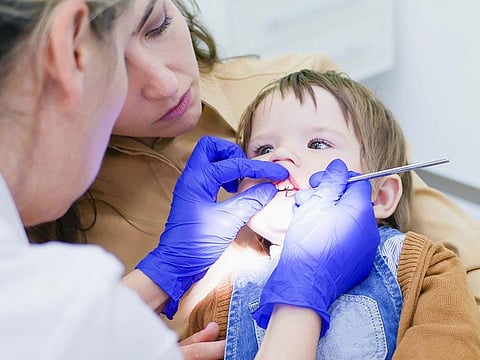Does your child need braces?
Doctors recommend taking kids to the dentist as early as age seven

Reyna, whose name has been changed upon request, would try to smile without her teeth showing. She was shy and often looked at her overbite in the mirror with worry. “When she was nine and a half we took her to see a few dentists,” recalls her mum. “The first time we took her, the dentist said give it a little time and then we can do it.” But two months on, she was ready for them.
Most children in her class have braces, her mum explains, and so she could see real-time changes. “She’s had braces for six months [she got them when she was 10.5] and she can already see a change in her smile; it’s giving her so much more confidence,” she says.
Also Read: How to solve your baby’s teething troubles
Also Read: Should a two-year-old have a root canal?
Dr Firas Hamzeh, Specialist Orthodontist at The Dental Studio in Dubai, recommends early intervention. He says children should visit an orthodontist as early as age seven. “Early treatment, when required, may prevent more serious problems from developing and may make treatment at a later age less complex,” he adds.
He points to the positioning of the teeth and the alignment of the jaws. “Braces will align the teeth and put the upper and lower teeth together in good shape,” he says.
It’s certainly what 12-year-old Yash is looking forward to. “Yash has had dental issues since he was like two or three; he’s had cavities, he’s had teeth being pulled out and then he’s also had [to deal with] very bad placement,” says 40-year-old Indian mum Mukhta Sabharwal.
It was, she says, not a question of whether he’d get braces but rather when. As the enamel began to overlap, he would broach the subject himself. “We told him that at the age of 10 he’d be seeing an orthodontist not just a regular dentist, and that then he’d get his braces. But also I’d prepared him mentally with my own experiences [I had braces too] – it’s simple, they will give you anaesthesia and then it’s a matter of two years and then you are sorted for life,” she recalls.
Yash’s was a complicated case owing to the poor spacing between teeth and his small jaw. “We’ve been to many doctors. Someone even required a minor surgery – almost like a root canal. Then we went to a very senior orthodontist, someone who has been practising here for about 40 years. He said he would pull some teeth out but would also make space for the new ones to come in,” she says.
Nine months on, she says, there’s a slow but steady progress. “We will just have to wait and watch but I think it’ll come through – at least 90 per cent of it,” she says.
Kids with braces should do this, not that
Avoid hard food like candy, popcorn, crispy food in order to avoid loose braces and wires. Brush the teeth carefully after each meal, as instructed by the orthodontist. Maintain regular check-ups with the dentist and the hygienist.
When you’ve got braces, oral hygiene becomes doubly important. For one thing, you may find the leftovers of a meal stuck under a metal mesh. Expat Nidhi Ahuja’s daughter, Akshara, who began to sport braces at nine and a half, uses two types of brushes to keep her inserts clean.
And Reyna tends to keep close vigil on the state of her veneers – brushing after each meal and gargling when at school.
Bad breath and braces
Is it possible for those metal wires in your child’s mouth to cause him or her to have bad breath? Absolutely, say experts. It’s a fallout of poor oral hygiene. “If food particles get stuck in the braces and are not removed properly, bacteria in the mouth will start feeding on it, causing odorous breath,” says Lubab Jassim Mohammed, Specialist Paediatric Dentistry at Dubai-based Medcare. Other reasons for bad breath, she explains, are:- Poor oral hygiene Gum disease and infection in the mouth Dry mouth Respiratory tract and gastrointestinal tract diseases Other diseases like cancer or metabolic disorders If the reason for bad breath is not the braces, then the patient should seek medical advice.
Dentist visits can be scary – and painful. And then there’s the recovery time. “Reyna goes to the dentist every month,” says her mother, for adjustments. But as the wires are tightened or moved from area to area, it inflames the mouth. “For two to three days afterwards her face is swollen, she has to have painkillers and a liquid diet,” says her mum.
In Yash’s case, this period may be a little prolonged. “He’s had to have his teeth extracted and that hurts.
“We give him cold food – such as ice cream. For the days post procedure, we give him tepid food, soupy things. We spoil him. We keep him busy. He can’t eat solid food for a couple of days,” she says.
Fortunately, say the parents, the one thing that’s changed over time is mindset. None of the kids whose parents Gulf News spoke to have been bullied over their braces. “Kids these days are much more accepting of those with braces and so she’s not had to contend with things like bullying,” explains Ahuja.
And the kids themselves know it’s a temporary measure. “Anything that aesthetically enhances your features is bound to give you confidence," says Sabharwal.
And so it has – given the kids a reason to smile.
Essential questions
So what’s the ideal age for braces? What are the different sorts you can choose from? Marcela Barreto, DentalZorg Dentistry Dental Clinic Dubai, offers answers to some frequently asked questions.
At what age should you consider getting your child braces?
It is recommended to bring your kid to the dentist by the time they’re seven years old to check their teeth. This is the age at which they start getting their permanent teeth and a good stage to monitor if their teeth and jaw are growing correctly and catch any problems right at the start.
The best age to get braces will depend on the bite or alignment issue that needs to be corrected. It will also depend on the child as everybody grows at different rates.
However, a general rule is kids should get braces between the ages of nine and 14. Some interceptive and preventative care can be started earlier as well to prevent a more drastic orthodontic treatment in the future.
The best age to get braces will depend on the bite or alignment issue that needs to be corrected. It will also depend on the child as everybody grows at different rates.

Why should someone get braces?
Braces will fix bite issues including:
What are the signs point to a need for braces?
Which braces are the best?
Each bite issue will have different treatment and braces options.
There are quite a few choices that can make orthodontic treatment more customised, such as:
Functional appliances: This type of braces work to help correct bite issues, guiding the teeth and bite into the ideal position. They work better for children up to the age of 14 as they are the most effective during active stages of growth.
Some examples of functional appliances are:
Traditional braces: These consist of standard metal brackets that are placed on the teeth with a bond and connected by wire. Periodic tightening is required in these cases. Those are still the most common orthodontic option.
Cosmetic options: These include ceramic braces with clear brackets. It takes a little more time to fix issues if using these.
Invisalign: This is a set of clear plastic aligners, each of which is made specifically for a patient; each aligner will be used for an amount of time and then changed. It is designed on the computer by your dentist. Usually, this works a bit faster than a traditional set.
What’s in the dental tool kit a child with braces needs?
Braces create new spaces to trap particles of food. Maintaining good oral health is really important. It is recommended to clean the teeth at least four times a day: after all three meals and before you go to bed.
These tools can help:
If a child has bad breath, what can you do?
Braces make it easier for tiny particles of food to get trapped underneath the brackets and wires. These foods are broken down by bacteria, and a by-product of that process is an unpleasant smell, resulting in a bad breath. It could also be coming from the tongue, where there are bacteria. You can regularly brush your tongue with a toothbrush or a tongue cleaning tool, such as a scraper.
That’s one of the reasons why methodical brushing and flossing routine is required.
If even with good and consistent oral hygiene the bad breath persists, talk to your doctor as this could be a sign of caries, gum disease and mouth nose and throat Infections.
Have a topic you'd like discussed? Write to us at parenting@gulfnews.com



